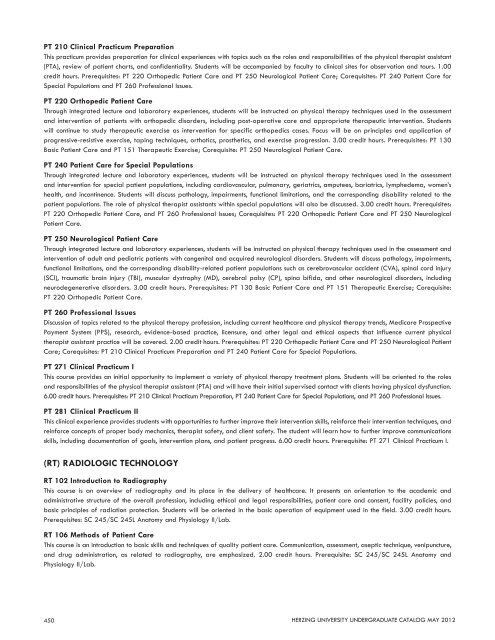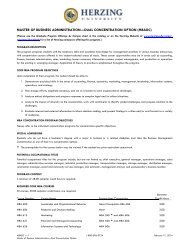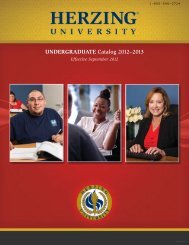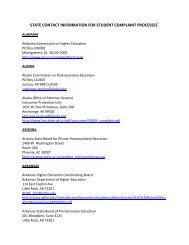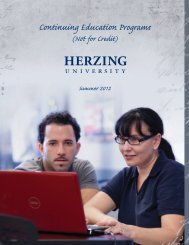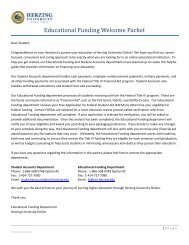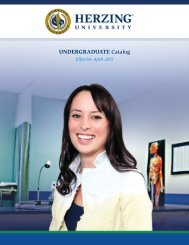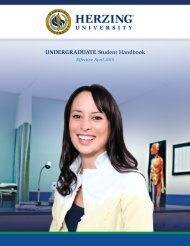(PT) PHYSICAL THERAPIST ASSISTANTPT 101 Introduction to Physical TherapySynopsis of the historical, philosophical, and organizational context of the physical therapy profession within the healthcare delivery system willbe given. Students will be instructed on how to establish therapeutic communication, business practices, and personal professional development.The course will introduce professional ethics and healthcare literature and investigate the scope and practice of physical therapist assistantsand their role within the physical therapy profession. Students will discuss the personal and professional qualities of the healthcare provider,communication needs, professional ethics, cultural diversity, and the psychological aspects of treatment. The student will be introduced tothe common conditions in physical therapy practice. 3.00 credit hours. Prerequisites: SC 245/SC 245L Anatomy and Physiology II/Lab;Corequisites: PT 115 Pathophysiology for Physical Therapist Assistants and PT 120 Fundamentals of Physical Therapist Assistant Practice.PT 110 Functional KinesiologyThrough integrated laboratory and lecture, this course will instruct students on the science of movement. Functional anatomy and physiologywill be reviewed. Students will be instructed on descriptive terminology as it relates to kinesiology. Biomechanical principles will be discussedand applied. The relationship of these principles to the hip, knee, ankle, elbow, forearm, wrist, hand, lower extremity, head, neck, and trunkwill be explored in detail. Students will be introduced to range of motion and palpation of bony prominences, joints, and muscles. An in-depthanalysis of human movement with emphasis on typical gait and posture will be incorporated into the course. 4.00 credit hours. Prerequisites: PT101 Introduction to Physical Therapy, PT 115 Pathophysiology for Physical Therapist Assistants, and PT 120 Fundamentals of Physical TherapistAssistant Practice; Corequisite: PT 140 Therapeutic Modalities.PT 115 Pathophysiology for Physical Therapist AssistantsPathophysiology includes the study of diseases and disorders commonly seen in physical therapy practice. An overview of etiology,manifestations, and treatment of significant diseases, with emphasis on the musculoskeletal, nervous, and cardiopulmonary systems will beprovided. The pharmacological interventions for common system dysfunctions treated in the physical therapy profession will be discussed andpresented. 2.00 credit hours. Prerequisites: SC 245/SC 245L Anatomy and Physiology II/Lab; Corequisites: PT 101 Introduction to PhysicalTherapy and PT 120 Fundamentals of PTA Practice.PT 120 Fundamentals of Physical Therapist Assistant PracticeThis course is an overview of observation, interviewing, and medical note-writing techniques. Subject matter includes: medical terminology;review of various assessments and formats for treatment plans; progress notes; and discharge summaries. Emphasis is on writing style,reimbursement guidelines, and legal aspects of note writing. The course discusses topics related to written communication and behavioralexpectations within the physical therapy profession, including psycho-emotional aspects of caring for the patient, psychosocial problems of theill and disabled, aging, medical ethics, and professional ethics. 2.00 credit hours. Prerequisites: SC 245/SC 245L Anatomy and Physiology II/Lab; Corequisites: PT 101 Introduction to Physical Therapy and PT 115 Pathophysiology for Physical Therapy Assistants.PT 130 Basic Patient CareThrough integrated lecture and laboratory experiences, students will be instructed on basic healthcare skills used in physical therapy includingpractice in wheelchair management, body mechanics, transfers, gait training, infection control, and first aid skills. Students will be introducedto issues involving the physical environment and architectural barriers. They will also be introduced to the measurement of anthropometricalcharacteristics, vital signs, range of motion, and pain. This course includes identification of anatomical structures as well as therapeuticintervention using adaptive and assistive devices, soft tissue manipulation, massage, stretches, and joint range of motion techniques. 3.00 credithours. Prerequisites: PT 110 Functional Kinesiology and PT 140 Therapeutic Modalities; Corequisite: PT 151 Therapeutic Exercise.PT 140 Therapeutic ModalitiesStudents will participate in lectures and integrated laboratory experiences to explore therapeutic intervention utilizing physical agentsincluding heat, cold, light, sound, water, electricity, and electromagnetic waves in the treatment of acute and chronic diseases and injuries.Students will be introduced to wound care, burn care, and infection control. Emphasis will be on the application and safe, appropriate use oftreatment modalities. 3.00 credit hours. Prerequisites: PT 101 Introduction to Physical Therapy, PT 115 Pathophysiology for PTAs and PT 120Fundamentals of PTA Practice; Corequisite: PT 110 Functional Kinesiology.PT 151 Therapeutic ExerciseThrough integrated lab and lecture, this course will instruct students on therapeutic exercise, including basic principles of exercise and basicassessment skills pertaining to joint and muscle function. Emphasis will be on the implementation and progression of exercise programsfor correction of specific conditions, muscle weakness, and joint limitations as well as goniometric and manual muscle-testing assessment.The laboratory experience will give students hands-on experience with the techniques being taught, (e.g., strengthening, range of motion,stretching, or conditioning exercises) as well as balance, coordination, posture, or training. Students will also have hands-on experience withmeasuring vital signs, pain, muscle strength, muscle length, and range of motion. They will have an opportunity to practice and master theskills necessary prior to a clinical education setting. 3.00 credit hours. Prerequisites: PT 110 Functional Kinesiology and PT 140 TherapeuticModalities. Corequisite: PT 130 Basic Patient Care.UNDERGRADUATE Course descriptions 449
PT 210 Clinical Practicum PreparationThis practicum provides preparation for clinical experiences with topics such as the roles and responsibilities of the physical therapist assistant(PTA), review of patient charts, and confidentiality. Students will be accompanied by faculty to clinical sites for observation and tours. 1.00credit hours. Prerequisites: PT 220 Orthopedic Patient Care and PT 250 Neurological Patient Care; Corequisites: PT 240 Patient Care forSpecial Populations and PT 260 Professional Issues.PT 220 Orthopedic Patient CareThrough integrated lecture and laboratory experiences, students will be instructed on physical therapy techniques used in the assessmentand intervention of patients with orthopedic disorders, including post-operative care and appropriate therapeutic intervention. Studentswill continue to study therapeutic exercise as intervention for specific orthopedics cases. Focus will be on principles and application ofprogressive-resistive exercise, taping techniques, orthotics, prosthetics, and exercise progression. 3.00 credit hours. Prerequisites: PT 130Basic Patient Care and PT 151 Therapeutic Exercise; Corequisite: PT 250 Neurological Patient Care.PT 240 Patient Care for Special PopulationsThrough integrated lecture and laboratory experiences, students will be instructed on physical therapy techniques used in the assessmentand intervention for special patient populations, including cardiovascular, pulmonary, geriatrics, amputees, bariatrics, lymphedema, women’shealth, and incontinence. Students will discuss pathology, impairments, functional limitations, and the corresponding disability related to thepatient populations. The role of physical therapist assistants within special populations will also be discussed. 3.00 credit hours. Prerequisites:PT 220 Orthopedic Patient Care, and PT 260 Professional Issues; Corequisites: PT 220 Orthopedic Patient Care and PT 250 NeurologicalPatient Care.PT 250 Neurological Patient CareThrough integrated lecture and laboratory experiences, students will be instructed on physical therapy techniques used in the assessment andintervention of adult and pediatric patients with congenital and acquired neurological disorders. Students will discuss pathology, impairments,functional limitations, and the corresponding disability-related patient populations such as cerebrovascular accident (CVA), spinal cord injury(SCI), traumatic brain injury (TBI), muscular dystrophy (MD), cerebral palsy (CP), spina bifida, and other neurological disorders, includingneurodegenerative disorders. 3.00 credit hours. Prerequisites: PT 130 Basic Patient Care and PT 151 Therapeutic Exercise; Corequisite:PT 220 Orthopedic Patient Care.PT 260 Professional IssuesDiscussion of topics related to the physical therapy profession, including current healthcare and physical therapy trends, Medicare ProspectivePayment System (PPS), research, evidence-based practice, licensure, and other legal and ethical aspects that influence current physicaltherapist assistant practice will be covered. 2.00 credit hours. Prerequisites: PT 220 Orthopedic Patient Care and PT 250 Neurological PatientCare; Corequisites: PT 210 Clinical Practicum Preparation and PT 240 Patient Care for Special Populations.PT 271 Clinical Practicum IThis course provides an initial opportunity to implement a variety of physical therapy treatment plans. Students will be oriented to the rolesand responsibilities of the physical therapist assistant (PTA) and will have their initial supervised contact with clients having physical dysfunction.6.00 credit hours. Prerequisites: PT 210 Clinical Practicum Preparation, PT 240 Patient Care for Special Populations, and PT 260 Professional Issues.PT 281 Clinical Practicum IIThis clinical experience provides students with opportunities to further improve their intervention skills, reinforce their intervention techniques, andreinforce concepts of proper body mechanics, therapist safety, and client safety. The student will learn how to further improve communicationsskills, including documentation of goals, intervention plans, and patient progress. 6.00 credit hours. Prerequisite: PT 271 Clinical Practicum I.(RT) RADIOLOGIC TECHNOLOGYRT 102 Introduction to RadiographyThis course is an overview of radiography and its place in the delivery of healthcare. It presents an orientation to the academic andadministrative structure of the overall profession, including ethical and legal responsibilities, patient care and consent, facility policies, andbasic principles of radiation protection. Students will be oriented in the basic operation of equipment used in the field. 3.00 credit hours.Prerequisites: SC 245/SC 245L Anatomy and Physiology II/Lab.RT 106 Methods of Patient CareThis course is an introduction to basic skills and techniques of quality patient care. Communication, assessment, aseptic technique, venipuncture,and drug administration, as related to radiography, are emphasized. 2.00 credit hours. Prerequisite: SC 245/SC 245L Anatomy andPhysiology II/Lab.450 <strong>Herzing</strong> UNIVERSITY undergraduate Catalog May 2012


